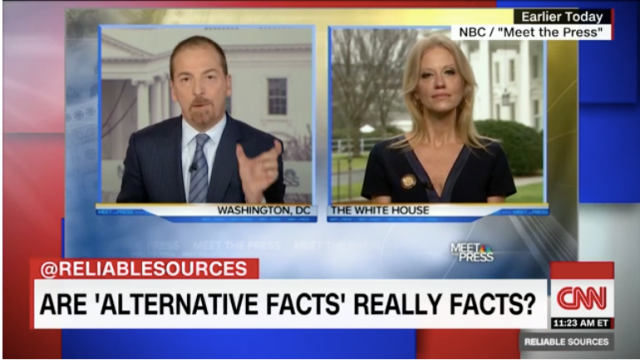The incoming administration and science do not get along. President Donald Trump has already met with vaccine critic Robert Kennedy Jr., called climate change a hoax on several occasions, once said that environmentally friendly light bulbs cause cancer… the list goes on.
Things got especially heated this past weekend, when scientists reacted to press secretary Sean Spicer making obviously false claims at the post-inauguration press briefing, and later, to Trump’s senior adviser Kellyanne Conway referring to Spicer’s comments as, wait for it, “alternative facts.” Scientists took their grievances to Twitter, and critics responded with a common refrain: “stick to science.”
@bgreene I like your books. Please stick to science though! You don’t know what you’re talking about in the area of politics.
— Steve Burns (@SteveBu04919298) January 22, 2017
But an increasing number of scientists are refusing to stay silent when it comes to the factual distortions and outright lies peddled by politicians.
Of course you’re right. How could anyone without a Ph.D. in political science possibly understand the phrase “alternative facts.” #altfacts https://t.co/qlntS7xpVG
— Brian Greene (@bgreene) January 22, 2017
Some people think scientists engaging in politics might harm their credibility, or worse, hide an issue with their scientific research. To the contrary, climate scientists like James Hanson and Michael Mann have become public advocates precisely because of their deep understanding of the real-world consequences of their chosen subject of study. Today, we don’t exactly (yet) have a case of astronomers and physicists being forced to defend whether black hole exists — instead, we have an administration challenging facts in general, which are the basis of all scientific research.
Naturally, scientists across many fields are feeling the need to speak out.
I will not “stick to science” when fascism is waltzing into the halls of power. You don’t have to agree with me but you won’t shut me up.
— Katie Mack (@AstroKatie) January 21, 2017
People still tellin’ me to stick to science. Sorry, folks. Silence is a tool of the oppressor, and we have enough tools around. https://t.co/BnaWx8d5gQ
— Matthew R. Francis (@DrMRFrancis) January 23, 2017
Science’s ultimate goal is to establish truth and facts by accumulating evidence. When the administration chooses to speak falsely to the American people, it’s up to scientists, the ones who work tirelessly to figure out what’s true, to stand up for evidence-based reasoning. “I think that if we see a situation where people are being encouraged to ignore objective reality, it’s kind of improtant to push back against that,” Katherine (Katie) Mack, astrophysicist at the University of Melbourne in Australia, told Gizmodo, “as people who have an interest in the idea that we can understand and interact with the world as it is.”
As a scientist, a science communicator, and a human being on Earth, let me be very clear: There is no such thing as an alternative fact.
— Phil Plait (@BadAstronomer) January 22, 2017
To folks who say “stick to science.”
Defending things like “facts” and “objective truth” is kind of important if you want science to exist.
— Robert McNees (@mcnees) January 23, 2017
“This isn’t particular to scientists, I just think democracy works best when people are invested, and care enough to speak out,” Robert McNees, associate professor in the Department of Physics at Loyola University Chicago, told Gizmodo in a Twitter direct message. “Yes. I mean, sure, I would love to tweet some interesting things about black holes today. But I am concerned that dishonest representations of climate science designed to erode public confidence might have some bad consequences for science in general, so I can’t ignore that.”
And for some, hot-button issues like Flint’s lead-tainted water and gay conversion therapy transcend science. “We’re human beings as well,” Matthew R. Francis, physics Ph.D and science writer, told Gizmodo. “These are issues that affect all of us.”
Update 8:37PM: This post has been updated to include a quote from Katie Mack.
